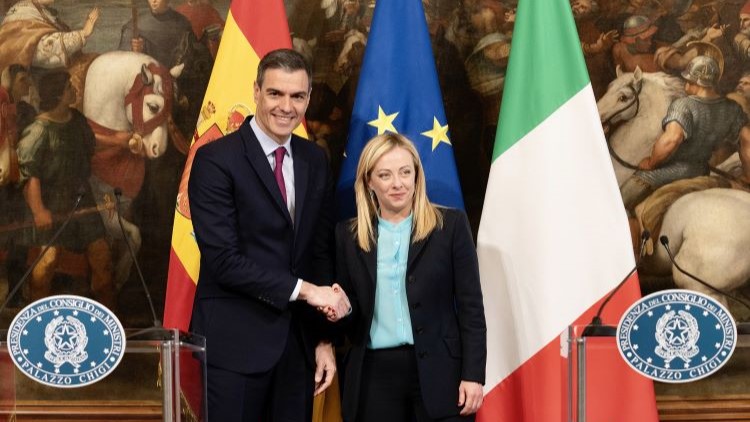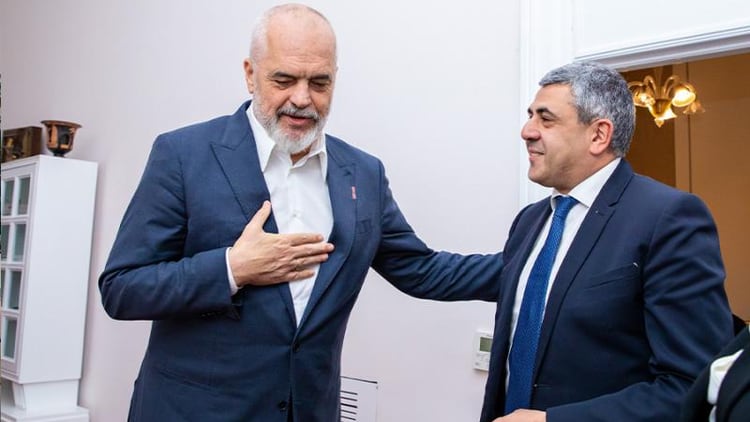Eduardo González
The President of the Government, Pedro Sánchez, and the Italian Prime Minister, Giorgia Meloni, overlooked yesterday their important differences on migration issues and agreed on the need for a European policy that “talks less about the internal dimension” and focuses “more on the external dimension” and on cooperation and collaboration with the countries of origin and transit in North Africa.
Sánchez concluded yesterday in Rome his last preparatory tour for the Presidency of the Council of the EU, which Spain will assume on July 1. The tour began last Tuesday with bilateral meetings with the President of the Republic of Cyprus, Nikos Christodoulides, and with the Prime Minister of Malta, Robert Abela, with whom he discussed, as well as with Giorgia Meloni, the issues that will be a priority for Spain during its European semester: energy, migration and open strategic autonomy.
During his meeting with Meloni, Sánchez also discussed the holding of the next bilateral summit. “Unfortunately this year it is going to be impossible,” admitted the Prime Minister during the statement offered to the media at the end of the meeting. “First, because we have the Spanish Presidency of the European Union and, secondly, because the domestic political agenda we have in Spain, with municipal and regional elections in May and the general elections at the end of the year, will make it impossible,” he added. “We remain in any case convened for the year 2024, where we will surely continue to strengthen these ties of friendship and strategic relations, both bilaterally and in the European plan between Italy and Spain,” he added.
Likewise, Sánchez assured that both he and Meloni agree on the need to “continue supporting” Ukraine in all areas. In this regard, the Italian Prime Minister recalled that “Italy will host a conference on the reconstruction of Ukraine at the end of April, and we are already working for the future, for the reconstruction, and on that we also agree”.
With regard to the priorities of the Spanish Presidency, Pedro Sánchez assured that the Spanish and Italian governments are “very much aligned” with regard to the objectives “because they are part of the main concerns of our fellow citizens, and also of the main concerns we have at European level”.
Migration
One of those objectives, he assured, is “the Pact on Migration and Asylum”. “I believe that an important step has been taken in recognizing by some countries that irregular migration is a European problem, it is not a problem of Italy, it is not a problem of Spain, it is not a problem of Malta or of any of the countries of first entry. It is a European problem that demands a European response and it demands a European response from a political point of view to reach an agreement between the 27 Member States, but it also demands economic resources to face the challenge of irregular migration,” he continued.
“Within what has been called the Pact on Immigration and Asylum,” he continued, “Italy and Spain, Spain and Italy share that what we have to do is to talk less about the internal dimension of migration and talk more about the external dimension of migration, that is, to talk about cooperation and collaboration with the countries of origin and with the countries of transit.” “This is the approach that Italy has, that Spain has and that, of course, when we have talked with the other countries about the Pact on Immigration and Asylum, we have asked for what seems quite reasonable,” he said. “Italy and Spain are the countries responsible for controlling our borders, but we also need to add to that responsibility another concept, which is that of solidarity, that of solidarity,” Pedro Sánchez warned. “The Spanish Presidency will also be working on this work to achieve a balanced approach to the Pact on Migration and Asylum between responsibility and solidarity in the second half of the year,” he added.
In this regard, Giorgia Meloni said, during the statement to the media, that “for the Italian side, but also for the Spanish side, the issue of migration is a very important issue”, in “a Europe that today looks much more carefully at the defense of its external borders“. “We agree that, at the next European Council in June, concrete progress can be made, on the part of the European Commission, on the initiatives to be taken forward, starting with the allocations, the fundamental investments to collaborate and cooperate and find structural solutions with the countries of North Africa”, she added.
Migration is one of the issues that have generated more differences between the current governments of Spain and Italy, especially because of the initial position of Giorgia Meloni (leader of the ultraconservative formation Brothers of Italy and supporter of the implementation of a naval blockade in the Mediterranean and the construction of walls at national borders to curb immigration) against the landing in Italian ports of immigrants collected during rescue and rescue operations carried out by NGOs and after the approval, The Italian government’s approval of rules on the disembarkation of migrants that humanitarian organizations have described as contrary to international law.
For this reason, according to Moncloa sources, Sánchez yesterday spun very fine to avoid the controversies on the internal policies of each country on migration issues and focus on the points of coincidence with Meloni in this matter, in an attempt to continue to gather support for his purpose of moving forward, during the Spanish Presidency, towards a Pact on Migration and Asylum that takes into account the point of view of the countries of first entry (such as Spain and Italy, but also Cyprus and Malta, the other two stops on his European tour) and that is based on European migration values, which include solidarity, responsibility and humanity towards migrants.






